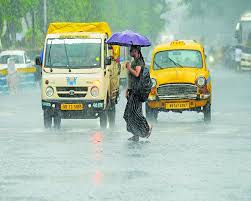Déjà vu: on India’s monsoon vulnerabilities.
India must reduce monsoon vulnerabilities, not just build response abilities.
Heavy rain has left a trail of destruction across North India. Several districts have been cut off across Himachal Pradesh. Jammu and Kashmir reported over 40 deaths while swollen rivers breached flood marks in Srinagar and Anantnag. In Punjab, entire villages have been inundated and farmland has disappeared. The national capital, too, reported excessive rainfall and a surging Yamuna. The intensity and the volumes of the southwest monsoon have been swinging sharply between the extremes. August’s rain has arrived in concentrated bursts, overwhelming fragile slopes in the Himalaya, bursting banks in the plains, and inundating low-lying regions. This erraticism has cut across geographies in a sign of the monsoon’s increasing unpredictability. The consequences go beyond immediate damage. Intense rain over short periods amplifies local erosion. Mountain slopes destabilise and raise risks for settlements far removed. Relief, in this context, cannot be confined to reactive measures. The knowledge that concentrated, destructive rainfall is now a recurring possibility makes it imperative for States and the Centre to invest in preventive strategies. Continuing to treat such events as unforeseeable emergencies is to deny the evidence already at hand.
Indeed, framing each calamity as “ unprecedented ” distracts from the lessons that should already have been learnt. In Himalayan States, forest clearance and road-widening continue sans adjustments such as slope-safe engineering in eco-sensitive zones despite experts warning of irreversibly weakened slopes. As catchments ’ buffering capacity shrinks, the chance of slope failure rises while silt accumulates in dams and rivers downstream, worsening the flood load. Yet, despite repeated disasters, the early warning and evacuation architecture remains underdeveloped. The capacity to forecast heavy rain has improved but it is not being translated into reliable ground-level warnings. Relief agencies mobilise once the damage has occurred, but systematic drills, pre-positioned supplies and community preparedness remain insufficient. Sadly, States and the Centre continue to pursue strategic road projects and urban expansion with urgency, even in landscapes repeatedly flagged as unstable, while climate-resilient infrastructure lags. Compensatory afforestation and rehabilitation rarely match the qualitative attributes of what has been lost. The cumulative effect is visible as denuded slopes, shrinking catchment areas, and populations at increasingly higher risk. Relief operations command headlines and budgets but unless sustainable infrastructure, landslide mitigation and early-warning systems are pursued equally seriously, the next monsoon spell will launch another cycle of loss. Shifting from acclaiming resilience, post facto, to systematically reducing vulnerabilities beforehand remains overdue.
